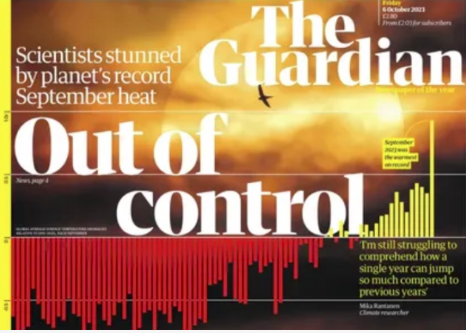By Paul Homewood

By David Whitehouse:
Why are many parts of the world so warm right now? Over the past four months we have seen record-breaking temperatures. September, globally-averaged, was 0.5°C above the previous record. 2023 is bound to be the warmest year of the instrumental record period. This is quite extraordinary, but what is behind this sudden spike in temperature?
Speaking on Channel 4, Piers Forster of the Climate Change Committee, said the sudden uptick in temperatures was 500 times bigger than climate scientists expected. He says the temperature record covered the whole world. Gavin Schmidt of the Goddard Spaceflight Center said 20% of the globe was setting new records. Others said it was just 12%. The Guardian’s front page said simply “Out of Control.”

It’s a state of affairs that has caused much confusion among climate scientists and commentators (often the same thing) many of whom attribute the sudden spike to climate change – but in doing so end up being rather muddled and contradictory. But is there anything really ‘out of control’? Is this abrupt climate change? Perhaps a transition, the crossing of a threshold?
There are some who look towards climate computer models for an explanation, saying that what we have seen over the past few months is in line with expected warming but at the upper end of the scale. This is highly unlikely because the events of a few months, especially during a strong El Niño year when there is so much variability going on, are not a climate change event, even though Zeke Hausfather has said that 2023 has been unusual for the climate. Actually if you view what has happened in terms of climate models it is a clear failure because none predicted the spike – once again showing their inadequacy.
In short, it’s not climate change because – as reputable climate scientists rightly emphasise – a sudden temperature spike or drop in a single year (or even in a number years) can and does happen quite frequently, although this year is a particularly unusual spike. Nevertheless, this sudden rise in temperature is on a far too short period to be driven by global warming which is a long-term trend.
Abrupt climate change is possible without human forcing and is not unusual in the climate record, even recently. Between 1976 and 1977, the Tropical Pacific underwent a rapid warming that had global impacts, including over North America, which was wetter than usual for the following two decades. Even today the cause of the 1976/77 climate shift is still debated.
The explanation for the recent event has not one cause but multiple.A major reason why parts of the world are so hot is the El Niño which warms the surface of much of the tropical Pacific. This typically raises the global average temperatures by about 0.1°C to 0.2°C, but it can be higher due to variability of the phenomenon. Having recently emerged from a triple La Nina, which cools the planet, it is perhaps understandable why this current El Niño is so intense.
Then there is also the new regulations regarding sulphur in ship fuels that has dramatically reduced the sulphur aerosol emission that has cleared the air over many oceans, especially the North Atlantic. Indeed sea surface temperatures in the North Atlantic are very high this summer after a period of rapid warming in the spring. Globally, the North Atlantic is far in excess of anything we’ve seen in that region.
Another contributing factor could be the Hunga Tonga eruption in the South Pacific last year. It injected large amounts of water vapour into the upper atmosphere probably increasing the greenhouse effect. Initial estimates are quite modest, but they could be revised as further work is done.
The Sun might also be playing a role, particularly since this current cycle has surprised astronomers by being more intense than expected. In addition to these we have seen persistent high-pressure systems over many land regions such as Australia and Western Europe.
Climate change means that these changes are acting on an increased global temperature baseline. However, it should be noted that climate change doesn’t explain why September 2023 is so much warmer than September 2022. The main difference is due to a combination of other factors.
The best time to judge what has happened over the past few months is to wait until the year after the current El Niño subsides. There is a significant chance that global temperatures will drop, just as they dropped after the last big El Niño spike in 2015/16.



